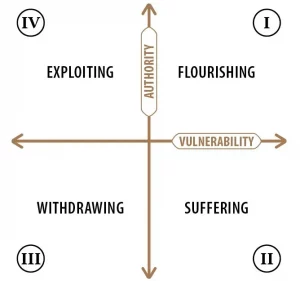Man Behind The Curtain
There is only one answer to the question, “How is your church doing?” It’s one word long: “Great!” In the last week, various people have asked me that question. One was a fellow pastor in my area, another was a mentor, and another was a congregation member.  To say anything else, to be completely honest, is risky and potentially messy. The temptation for anyone in leadership to create a facade is very real. Maintaining an outward appearance that conceals a less pleasant or credible reality is not only real but exhausting. Like the man in The Wizard of OZ who is trying to maintain the appearance of the Great and Powerful Wizard only to be caught turning knobs and pulling levers, crying out, “Pay no attention to the man behind the curtain.” While the temptation is real, it is also very common. It is this challenge that Simon Walker addresses in part one of his book The Undefended Leader.[1] In this post, I will examine two concepts Walker explores that are relevant to healthy leadership.
To say anything else, to be completely honest, is risky and potentially messy. The temptation for anyone in leadership to create a facade is very real. Maintaining an outward appearance that conceals a less pleasant or credible reality is not only real but exhausting. Like the man in The Wizard of OZ who is trying to maintain the appearance of the Great and Powerful Wizard only to be caught turning knobs and pulling levers, crying out, “Pay no attention to the man behind the curtain.” While the temptation is real, it is also very common. It is this challenge that Simon Walker addresses in part one of his book The Undefended Leader.[1] In this post, I will examine two concepts Walker explores that are relevant to healthy leadership.
Defended vs. Differentiated
First, in part one, “Leading Out of Who You Are,” Walker maps the world of a leader, including factors that create the environment in which leadership takes place: idealization, idealism, and unmet emotional needs. Walker characterizes the environment created by these three factors as “an Isolated and rarified one.”[2] He likens it to climbing a mountain with thinning air as you ascend with surroundings that grow harsher, protection decreases, and sustenance is scarce. The world of a leader can be unpredictable and risky. It’s natural to seek safety and establish defenses. A defended leader does not feel safe, so they set up protective measures. Walker identifies a primary defense strategy used by many leaders is developing a two-stage life. A front stage that represents what is visible to the world and a backstage that is concealed. As Walker states, “What lies behind the creation of a front stage and a backstage is the sense that we can’t entirely trust our audience, and so we need to manage what they see of us.”[3] Creating the backstage is an attempt to defend and protect ourselves. Leaders are tempted to play the hero on the front stage, while there may be chaos and fear behind the curtain. According to Walker, a leader must be undefended to become healthy and successful. Walker’s work helps leaders to identify this situation in themselves.
A self-awareness that can lead to what Edwin Frieman calls “Differentiation.” According to Friedman, differentiation is “The lifelong process of striving to keep one’s being in balance through a reciprocal external and internal process of self-definition and self-regulation.”[4] According to Friedman, the presence of a well-differentiated leader is the single most important factor for the health of a family, team, community, or nation. The defended leader maintaining a front and backstage is an undifferentiated leader. Similar to differentiation, being undefended is a life-long process, not necessarily a destination at which one arrives.[5] So how does a leader become undefended? This leads to the second concept I will explore in this post.
Vulnerability
What is the root cause of becoming a defended leader? Walker argues that it relates to how someone experienced the trustworthiness of others in their childhood.[6] Becoming an undefended leader means learning to override the fear of letting people see the backstage of our lives. It means finding freedom in vulnerability. Walker continues with what seems to be a consistent theme in leadership theory: To be a healthy, successful leader; one must be vulnerable.
Andy Crouch, a partner for theology and culture at Praxis, expanded my understanding of this dynamic in leadership in his book Strong and Weak.[7] Like Walker, Crouch contends that for people to flourish under the influence of a leader, there needs to be vulnerability. As the authority/power of a leader increases, so must vulnerability (see Figure 1.1).
Similar to the concept of a front and backstage, Crouch identifies a dichotomy in the life of a leader as perception vs. reality.[8] There is a level of vulnerability that is real vs. what is perceived. Leaders must bring people to the full reality of their hidden vulnerabilities to cultivate flourishing in those they lead. As Walker puts it, they must “Give Away Trust.”[9] Consider Jesus, who embodies flourishing leadership with full authority and maximum vulnerability. While there was a difference between the perception and reality of his authority and vulnerability, he brought in a few, Peter, James, and John, at key times to know more fully what was happening. They had access to both the front and backstage.
Takeaways
First, I must acknowledge the temptation to defend and identify opportunities to give away trust. This leads to a second: finding people I am willing to let backstage. Having these people know what’s going on behind the scenes will help me sustain an undefended life.
If space allowed, I would explore the tendencies of leaders Walker categorizes as Shapers, Difiners, Adapters, and Defenders in more depth, giving even more texture to the conversation of being an undefended leader.
__________________________________________________
[1] Simon Walker, The Undefended Leader, (Piquant Editions, 2010).
[2] Simon Walker, The Undefended Leader, 23.
[3] Simon Walker, The Undefended Leader, 36.
[4] Edwin Friedman, A Failure of Nerve, (New York, NY: Church Publishing, 2017) 194.
[5] Simon Walker, The Undefended Leader, 121.
[6] Simon Walker, The Undefended Leader, 60.
[7] Andy Crouch, Strong and Weak, (Downers Grove, IL: InterVarsity Press, 2016).
[8] Andy Crouch, Strong and Weak, 119.
[9] Simon Walker, The Undefended Leader, 120.
13 responses to “Man Behind The Curtain”
Leave a Reply
You must be logged in to post a comment.

Hi Chad,
Thank you for your – I enjoyed reading it.
In your experience, what risks have you encountered being a defended leader? How does this impact a leader’s effectiveness?
Cheers!
Shela, as I alluded to in the introduction, a primary risk is sharing with people beyond what gives a picture that everything is good. That is risky because I don’t want people to try and fix it for me or be critical of me. I know this comes from a place of pride that the Lord is working out for me, but that is a primary risk. Thank you for asking.
Chad,
Thanks for unpacking the difference between undefended/defended and undifferentiated/differentiated. I understand both concepts but it takes me a minute or two to figure out which is which.
As an undifferentiated leader, how might you respond to questions about your church in the future?
Adam, thank you for your question. As a differentiated/undefended leader, I will try to paint a more authentic picture that shows both the ways God is at work and the ways in which we, as a church, need to align with His word. Currently, the low-hanging fruit to address chronic anxiety and emotional triangles is thank you, Edwin Friedman!
Chad, thanks for your post. In your Takeaways you shared
a temptation to defend and noted that you must identify opportunities to give away trust and to find people you’re willing to let backstage.
What does this look like in practice? And would you be willing to share more of your thoughts about sharing the backstage of your life with certain people versus with a general audience?
Im not sure if that second question makes sense however I couldn’t help but wonder what you feel makes someone trustworthy enough to let backstage.
For me, time with someone has much to do with letting them backstage. My wife and kids all have back stage passes. I also have a few other pastor friends I have served with through the years that have back stage access.
Hi Chad! I really enjoyed reading this. I was particularly drawn to your thoughts on vulnerability. As front-line leaders, we have a tendency to mask this and pay the price for it, as Walker surmises through bad backstage behavior. As a leader, do you feel free to share vulnerabilities? In pastoral ministry, vulnerabilities are often seen as red meat for the wolves in sheep’s clothing.
Hi Chad – I have so much respect for pastors. I can only imagine the difficulty and the temptation to have a polished front stage that differs from the backstage.
At our church, we recently had a pastor exposed of egregious sin in the backstage – our entire congregation is devastated and I personally feel a bit disoriented.
I think for pastors it is especially important to have a congruent front and back stage, as the dissonance can result in damage that is nearly impossible to repair as a leader.
I am praying for you and our other pastors today, to have courage to be an undefended leader.
Thank you for your prayers.
Beautifully articulated, Chad. I love the Wizard of Oz reference of many knobs and levers. I am grateful for how you brought in Andy Crouch’s call for vulnerability, but phrased your second takeaway as “finding people I am willing to let backstage”.
A wise mentor of mine uses the phrase ‘healthy vulnerability’. A leader needs to know where and with whom to be raw and real (or welcome backstage), as opposed to simply exposing everyone to everything all the time. She characterized this as ‘unhealthy vulnerability’. So, thanks for identifying the welcome to the backstage of those ‘few’ sojourners who can walk with you. And may it bring the sustained, undefeated state of being. God bless you on your journey.
Thank you for your additional thoughts and blessing.
Thank you, Chad, for your post. I have learn a lot for it. It is interesting to see the Wizard of Oz in the analogy of Front Stage and Back Stage. I do agree that our Front Stage is the end results of our Back Stage. Not only that but the ‘unhealthy vulnerability’ in which you relate to the ‘Back Stage. What kind people are you referring to people that you (we) could allow them Back Stage? Thanks again.
Hi Chad, thanks for your post. I struggle with finding that balance of being vulnerable in a healthy way.
I have a similar question to Noel, so I thought I would add it here. What are some of the characteristics and “green flags” for people that you trust to bring backstage and be vulnerable in a healthy way? What do you feel is your next step in being more vulnerable and inviting more people backstage in your life?